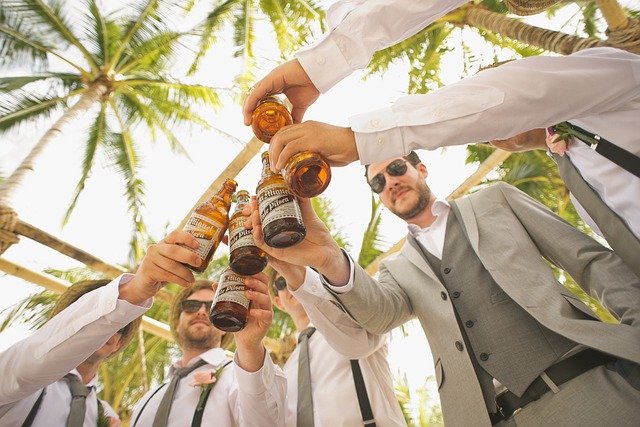It’s no secret that our youth are drinking both locally and around the country. Since 1993, the Department of Health Division of Alcohol and Drug Abuse Programs and the Department of Education Student Health and Learning Team has sponsored the Vermont Youth Risk Behavior Survey (YRBS), which takes place each year. In 2019 this report showed that over 50% of Vermont high school students had tried alcohol. It’s proven that lifetime alcohol use significantly increases with each grade level. According to the latest National Survey on Drug Use and Health (NSDUH), Vermont tops every other state in drinking rates among youth ages 12 to 20, with a whopping 37%. Each number seen here isn’t just a number, it’s a person, a child, a friend, someone who matters! The time is now to act against underage drinking!
Unfortunately, there is a false impression that kids like to hang out and have a “few beers,” and this isn’t ok. Kids shouldn’t be drinking at all and data shows, they are not only drinking a few beers but binge drinking to the point of risking their lives and they are driving under the influence. When a teenage driver gets behind the wheel after drinking, they are putting themselves and all of us in harm’s way. The 2011 Vermont Youth Risk Behavior Survey states, “Overall, 60% of students reported ever drinking alcohol.” 60% is a staggering number. Even if your child is not part of the 60% it doesn’t mean we shouldn’t talk about this life-threatening topic. When one child in our community hits the road after drinking, it doesn’t matter if they are “yours,” we live in a community, these kids are “ours.”
Reports have shown that 49% of students who drank in the past 30 days reported their usual source of alcohol as, “someone gave it to me.” If almost half of our youth are getting their alcohol from people right here in our community, we have a problem. Teenagers who abuse alcohol increase their risk of negative health effects because their organs, brain, and mental capabilities are still growing. Some of the most prominent negative effects of alcohol abuse on teens are emotional problems, behavioral problems, addiction and dependence, risky sexual behaviors, learning problems, brain damage, car accidents and more. No one wants to see our kids, or any kids make these lists! When someone gives a teenager alcohol, they could also be handing them all these extra problems. Alcohol abuse can seem like a temporary act but, the effects on teens can lead to serious consequences now and later in life.
There are steps to preventing alcohol abuse in our young people, especially for those who may be predisposed to have more challenges than others. Start by talking about alcohol and allow for open dialogue around all substances to gain trust and confidence to discuss these matters freely. Offer your children one-on-one time with the pediatrician or someone they trust to talk about alcohol, drugs, sex and/or any other topics that they may not want to share in front of mom or dad. Think of it as their private time to ask questions or answer questions in confidence. Hearing information from their trusted doctor may make a different impact and may make them feel comfortable enough to be open about their own choices. These talks should be as judgment-free as possible. Kids who are willing to talk and confide in adults are brave – don’t break their trust in you!
Make sure your actions confirm your words! Set a clear and firm policy with your kids: No alcohol, drugs, or tobacco until age 21. Use the new research on the teenage brain to explain that this is about keeping those brains safe. When you teach a child about the fact that their brains aren’t even fully developed yet, that may reach some kids. Share lived experiences and concerns you have for your child, as that may help. But also allow your child or the teenager you are sharing with to share too. If they feel comfortable enough to ask questions and learn, they may be less tempted to figure it out on their own.
Do not add to the problem! Never, as a parent, grandparent, friend, or just as an adult, never host a teenage party with drugs or alcohol. The liability alone is colossal if one of those kids goes out and drives and has a fatal accident. Other dangerous concerns are alcohol poisoning, drug use, date rape, etc. Do not put yourself in a situation where you are the one responsible. If you know other adults doing such things, it’s out of respect for your children and their peers that you take action.
As adults, we should also show kids how to use alcohol responsibly; if you do drink in front of youth, know they are watching you. They are watching what you drink, how much, etc. National dietary guidelines call for no more than one drink a day for women, two for men and it should go without saying, zero for anyone under 21 years old. Kids will also be interested to see that celebrations are possible without alcohol too! Show the young people around you that that is possible and remember, whether you like it or not, you are their role models. If you know you will be going to a social setting where alcohol will be abused, don’t bring your kids. Alcohol abuse should not be glamourized; alcohol abuse is dangerous for everyone, not just young people. Act as though the kids are watching because they are!
Prevention is most important when it comes to alcohol abuse in kids and adults. Teaching your young people what they need to know about alcohol, and keeping a close eye on their behavior, will help them to better prepare to make their way to healthy adulthood. Together, hopefully, we can act against underage drinking.
Mary Hoadley
Director of The Wellness Center


